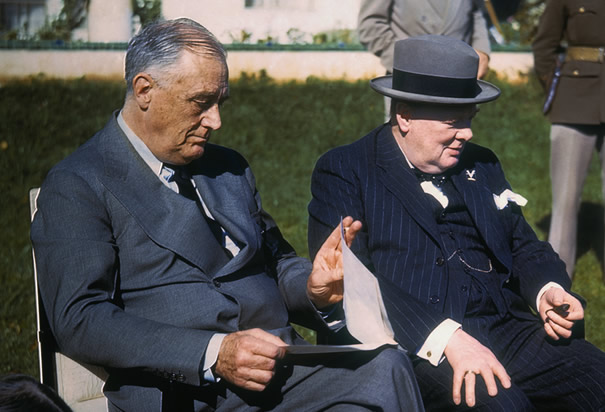
Roosevelt and Churchill: Don Quixote and Sancho Panza?
A colleague asks whether Winston and Clementine Churchill’s private name for President Roosevelt was “Don Quixote.” Also, who compared Roosevelt and Churchill to Don Quixote and Sancho Panza? This offers an interesting trawl through the sources.
So far as I can learn, the Quixote – Panza analogy for Roosevelt and Churchill (also FDR and his devoted adviser Harry Hopkins) occurred only during the 1943 Casablanca Conference (SYMBOL). Roosevelt proposed those code names, and I rather think Churchill had different image of them than FDR. (Oxford English Dictionary: “Quixote: Enthusiastic visionary, pursuer of lofty but impracticable ideals.”) Of course we can’t be sure. We must put this on our list of questions when we get to meet Sir Winston in the Afterlife.
Quixote and Sancho
The derisory term was rife in Parliament between the World Wars. It was applied to Bonar Law and Beaverbrook, Allenby and Wavell, Winterton and Shinwell, Churchill and Bracken, Chamberlain and Kingsley Wood. When Germany invaded the Low Countries in May 1940, General Alan Brooke presciently called French General Henri Giraud a Don Quixote who “would have ridden gallantly at any windmill regardless of consequences.” (Bryant, Turn of the Tide, 61)
In 1905 young Winston acquired an elaborate four-volume edition of Miguel Cervantes’ classic novel. Three decades later, Don Quixote was his twelfth and final installment in “The World’s Great Stories.” (News of the World, 26 March 1933; Collected Essays of Sir Winston Churchill, IV, 246-56.)
The tale lodged in Churchill’s photographic memory. He used the analogy with rapier effectiveness when Prime Minister Ramsay MacDonald returned with his foreign secretary, John Simon, after seeking war debt relief: “We have got our modern Don Quixote home again, with Sancho Panza at his tail, bearing with them these somewhat dubious trophies which they have collected amid the nervous titterings of Europe.” (23 March 1933, in Churchill, Arms and the Covenant, 73.)
Roosevelt’s idea
Nigel Hamilton in his Roosevelt book, Commander in Chief, is wrong when he writes… “[FDR] had chosen as his nom de plume Admiral Q, in prior secret communications with Churchill—a humorous reference to his Spanish literary hero, Don Quixote. (Hopkins was ‘Mr. P.’ for Sancho Panza.)” John Grigg explains that
Roosevelt was given the code name ‘Admiral Q,’ proposed by Churchill in a cable in which he also suggested that he himself should go by the name of ‘Mr P.’ (This enabled him to add: ‘We must mind our P’s and Q’s.’) But in fact the name given to him was ‘Air Commodore Frankland’ and he arrived at the conference wearing an air commodore’s uniform. (Grigg, 1943: The Victory That Never Was, 60)
It was Roosevelt who had suggested the Cervantes characters for Casablanca code names, rather pointedly emphasizing Britain’s diminished importance: “The aliases from this end will be a) Don Quixote and b) Sancho Panza.” (R-252, in Kimball, Churchill & Roosevelt, The Complete Correspondence II, 2 January 1943.)
“Admiral Q and Mr. P”
Churchill’s counter-proposal can be interpreted to read that he well understood the inflexion Roosevelt had intended. “However did you think of such an impenetrable disguise?”
Churchill quickly added: “In order to make it even harder for the enemy and to discourage irreverent guesswork, propose Admiral Q and Mr. P.” (3Jan43, in Churchill, Hinge of Fate, 601.) Historian Warren Kimball suggests Churchill said this believing that FDR’s code names might make the meeting seem “quixotic” to people. (Forged in War, 183.)
But the public would not generally be aware of code names. I suspect Churchill’s idea was as Grigg wrote, allowing him to use the “P’s and Q’s” quip—and because he was uncomfortable thinking of himself as FDR’s Sancho Panza.
That the Private Office used the term “Don Q” before Casablanca suggests that for Churchill’s inner circle, FDR really was a Don Quixote, tilting at windmills in quest of impossible dreams.Who knows how often he referred to FDR as DQ in private asides?
In any case, Cervantes’ tale was certainly on Churchill’s mind at Casablanca. There he told Roosevelt they couldn’t tell British from American troops in the North Africa landings… “In the night all cats are grey.” (Don Quixote, Part 2, Ch. 33; Langworth, Churchill by Himself, 62).
Sancho’s burro…
Ten months later at Teheran, Britain’s dwindling influence was more readily apparent to Churchill. His thoughts might well have traced back to Cervantes and, if not to Sancho Panza, to Sancho’s burro:
There I sat with the great Russian bear on one side of me, with paws outstretched, and on the other side the great American buffalo, and between the two sat the poor little English donkey who was the only one, the only one of the three, who knew the right way home.







2 thoughts on “Roosevelt and Churchill: Don Quixote and Sancho Panza?”
Thanks very much! RL
A superb article thanks Richard. Currently reading Rick Atkinson’s The Army at Dawn: The War in North Africa 1942-43, so Churchill’s comment, “In the night all cats are grey” is very timely.
Comments are closed.